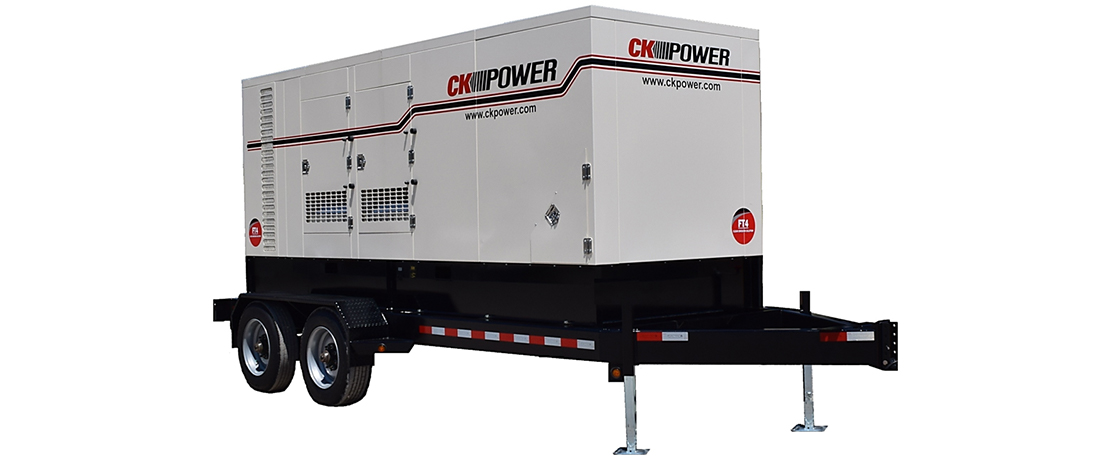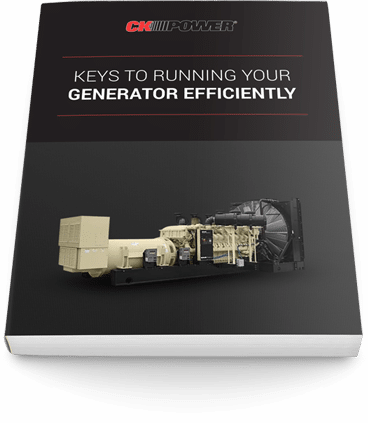Regardless of application, fuel-efficiency should be one of your key considerations when purchasing a generator set. From fuel savings to a lower cost of ownership, fuel-efficient generators provide many benefits to the end user.
In this post, we’re going to explore what you need to think about when choosing a generator based on fuel efficiency, such as which fuel to use and which products to consider.
Diesel vs. gaseous generators: Which is best for fuel efficiency?
When you compare the volume of fuel needed to power a generator, diesel gen sets are more fuel-efficient than their gaseous counterparts. That doesn’t, however, mean that diesel is the best option for every application.
For example, it wouldn’t make sense to use a diesel generator in oil and gas applications where there’s a virtually limitless supply of free gas on site. On a construction site, however, there’s already an abundance of diesel-fueled equipment, so a diesel generator would be the better choice.
When choosing between diesel and gaseous generators, you also need to compare fuel costs to the potential fuel efficiency savings over the lifetime of the equipment. Though less efficient, natural gas is generally cheaper than diesel as a fuel source. Because fuel prices fluctuate, you’ll want to look at the fuel market at the time of purchase. If diesel fuel prices are high, a gaseous gen set might be more appealing. If diesel fuel prices are lower, then fuel efficiency might make diesel the most cost-effective solution over the lifetime of the gen set.
Basically, diesel generators are the better choice where efficiency is concerned. That’s why all of our fuel-efficient product recommendations in this article are Tier 4 Final-certified diesel gen sets.
Still, you should work with your generator distributor to decide which option will provide the best lifetime value for your particular application. For more information, read our detailed comparison of the pros and cons of diesel and gaseous generators here.

Three fuel-efficient generators suitable for almost any application
All of CK Power’s diesel generators are Tier 4 Final solutions, and reduce operating costs for the end user — we pride ourselves on it. Out of all the options, though, one line of generators has proven to outperform the others in terms of fuel efficiency: Our line of Tier 4 solutions powered by the world-class Volvo Penta D13 engine. The specs for three of these generators are listed below, but we first wanted to discuss why we recommend this line for fuel efficiency.
-
About the Volvo D13 engine platform
The Volvo D13 is one of the world’s most popular engine platforms — and for good reason. It surpasses the competition in fuel efficiency, adherence to Tier 4 emission standards and versatility of application. It has a wide variety of on- and off-highway applications —from construction to shipping to mining and more— and its state-of-the-art system improves fuel efficiency by as much as 5%.
Volvo’s advanced combustions technology (V-ACT) is designed for optimum fuel economy. Its leading-edge engine management system adapts to various load levels and optimizes engine performance accordingly. The V-ACT system also works to maximize power output by converting more fuel into mechanical energy, with less heat rejection. The result is reduced operating, maintenance and downtime costs.
-
Meeting emission standards
To comply with Tier 4 Final standards, Volvo opts for a simple two-part emission control system: selective catalytic reduction (SCR) and light exhaust gas recirculation (EGR). Diesel combustions produce two main types of harmful pollutants regulated by Tier 4 Final regulations: nitric oxides (NOx) and particulate matter (PM). The D13’s engine design emits low levels of PM, but still produces high NOx levels.
Their powerful SCR system converts harmful NOx into nitrogen and water —naturally occurring substances in our environment— through a chemical reaction with a urea solution called AdBlue®.
The light EGR recirculates some exhaust gas back into the combustion chamber, replacing a percentage of oxygen with CO2, causing less NOx to be formed during combustion. Not only does the EGR system further reduce the emission of nitric oxides, it lowers peak combustion temperatures and reduces the cooling needs of the unit. And, because it repurposes gas that otherwise would’ve been wasted, EGR also has added fuel economy benefits. For more information on Tier 4 —and whether you need a Tier 4 unit for your application— read our in-depth discussion on the regulations here.
From mobile to stationary, CK Power has multiple configurations for the generator line up using the D13 Tier 4 Final engine platform. The standard unit in this kW range —the CK300VM-T4 Final model— comes with a 300-gallon sub-base fuel tank resulting in 19 hours of run time at 100% load.
Here are three models in this line up perfect for optimizing fuel efficiency in almost any application:
-
CK300VM-T4 Final
Ratings range: 60 HZ (3 phase / .8 power factor)
Prime rating: 225 kW / 280 kVA
Standby rating: 250 kW / 300 kVA
Features:- Volvo Penta TAD1371 Tier 4 Final / CARB certified
- Does not require regeneration
- 300 gallon, 19 hour run time at 100% load
-
CK375VM-T4 Final
Ratings range: 60 HZ (3 phase / .8 power factor)
Prime rating: 275 kW / 343 kVA
Standby rating: 300 kW / 375 kVA
Features:- Volvo Penta TAD1372 Tier 4 Final / CARB certified
- Does not require regeneration
- 300 gallon, 17 hour run time at 100% load
-
CK430-T4 Final
Ratings range: 60 HZ (3 phase / .8 power factor)
Prime rating: 325 kW / 406 kVA
Standby rating: 350 kW / 430 kVA
Features:- Volvo Penta TAD1375 Tier 4 Final / CARB certified
- Does not require regeneration
- 300 gallon, 16 hour run time at 100% load
The simplicity of the Volvo Penta D13 design not only results in improved fuel efficiency and reduced emission of harmful pollutants — it also means it’s easier to maintain. Used as the base in this line of CK Power Tier 4 generators, the D13 provides fuel-, maintenance- and time-savings onto you, the end user. For more fuel-efficient product recommendations, check out our entire line of Tier 4 generators.
Or you can keep learning about efficiency for both diesel and gas sets by checking out our guide to running your generator efficiently. You’ll learn what you, as a generator owner, can do to minimize fuel consumption and maximize uptime over the lifetime of your gen set — click here to download the in-depth guide now.


